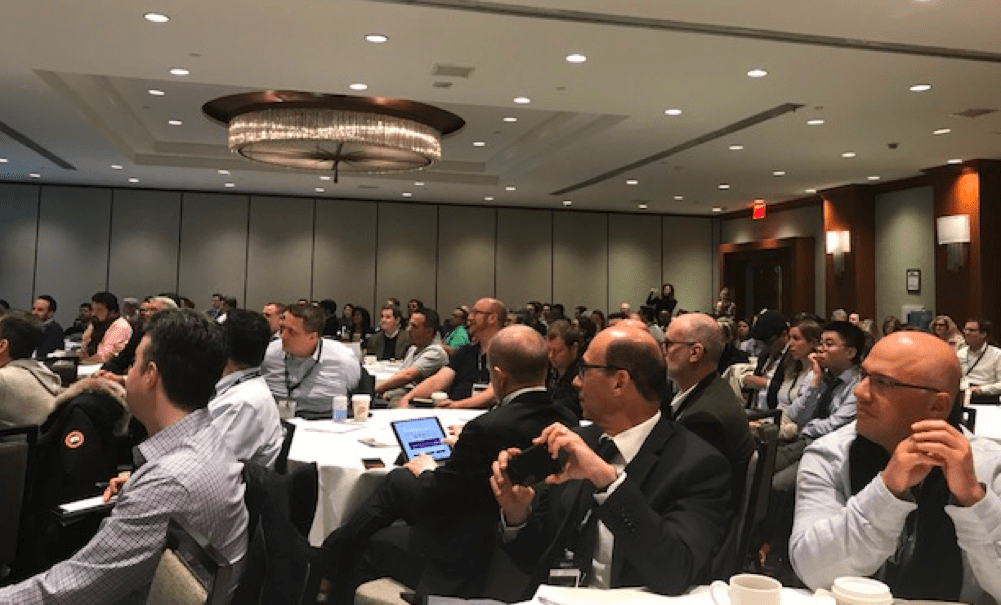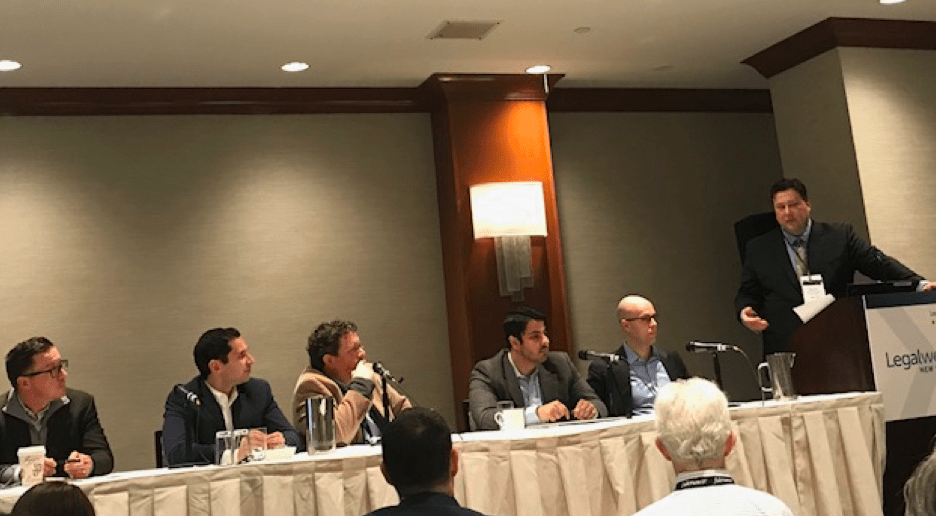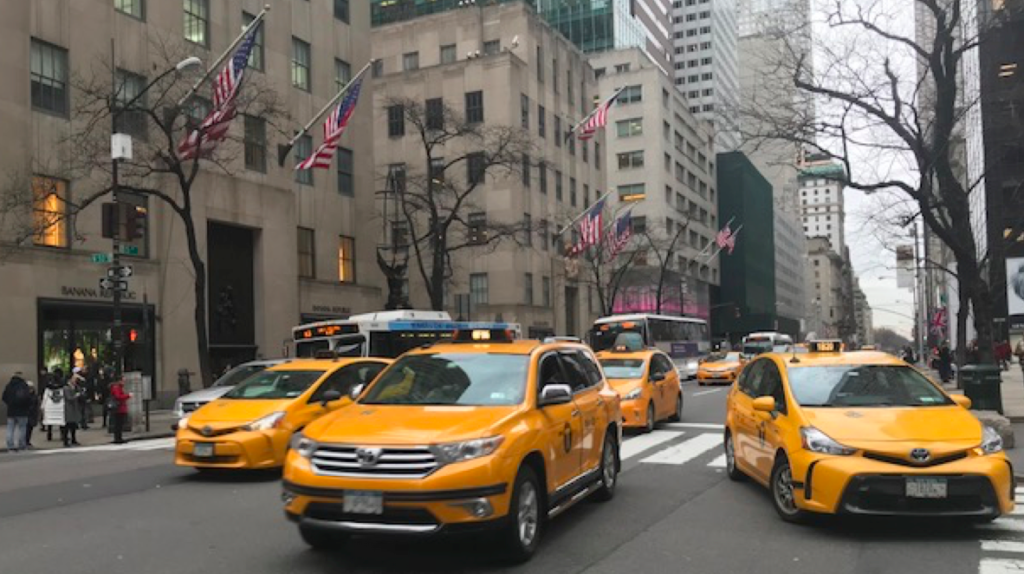
As readers will have noted, there is a major legal tech conference on in New York this week, AKA, Legal Tech New York. Several legal AI companies have turned up and also made some great announcements: see here, re. Kira Systems/NetDocuments and here, re. Thomson Reuters/IBM Watson; and also here re. ROSS Intel and its new EVA legal brief research tool.

In fact, Monday’s opening salvo brought with it not just AI news, but a series of sessions that covered the legal AI and automation field, brought together as an ‘AI Bootcamp’. To that end, Artificial Lawyer has been very lucky to find some great Guest Correspondents who have written up their impressions of the day:
Catherine Ostheimer, SVP, Marketing & Communications at Neota Logic , plus Ryan McClead, VP, Client Engagement & Strategy, also at Neota; and, Ari M. Weinstein, Founder, Confident Contracts.
First off, let’s hear from Catherine, Ryan and team, then followed by Ari. Artificial Lawyer recommends reading both views of this packed first day as it gives insights from different angles, providing an overall great picture of what went down in New York on Monday.

What do Legos, female names (think Kira, Cara and now EVA) and Access to Justice initiatives have in common?
It was all part of the AI Bootcamp Session yesterday afternoon on the first day of the conference at the New York Hilton Midtown called “Use Cases and Applications of AI in Legal Services.”
The panel included: Ryan at Neota Logic, along with Noah Waisberg, Co-Founder & CEO, Kira Systems Andrew Arruda, CEO & Co-Founder, Ross Intelligence, Jake Heller, CEO, Casetext, and Aaron Crews, Littler Mendelson, served on a lively panel to a packed room of about 200 attendees.
The session was adeptly moderated by Patrick Fuller, Senior Director, ALM Intelligence, who asked three poll-style questions at the start of the session:
1) how many of you are thinking of using AI but have not yet purchased any AI solutions,
2) How many of you are working on AI projects today?
3) How many of you have purchased AI technology, but have not yet started using it.
If this session was a year or two ago, most would fall in the first camp. But here it is 2018, and the crowd broke down evenly into the three groups. AI is not yet mainstream in legal circles, yet it is clearly gaining ground.
The two-hour panel session covered AI and the future of legal work, the value of AI, as well as practical use cases and ways to get started, and was at times hampered by, you guessed it, technology. It seems that having to use Windows to advance presentations stumped this group of super intelligent AI experts, some who admitted to being more comfortable operating on a Mac.

Key takeaways from the panel?
- On the impact of AI to the legal profession: “This means a soup-to-nuts re-do of what it means to be a lawyer. We ‘re ultimately knowledge workers, and we work with data. AI allows us to to the data gathering and synthesis part much earlier in the process and add in contextual analysis—it’s a whole new day.” – Aaron Crews
- On will there be “robot lawyers”: “Lawyers are not going anywhere, they will just be working on more important things. Instead of robot lawyers we be making human lawyers less robotic.” – Andrew Arruda
- On the category of AI known as “expert systems”: There’s no machine learning in an expert system, but if you need to have accuracy in your answers, and have a record of how you arrived at that answer, then this is the best way to get there.” – Ryan McClead
- On AI advancing the legal profession: “Think of the systems you build with AI as a sparring partner or smart colleague. They are only going to make you better.” – Andrew Arruda.
- On AI improving the quality of advice: “With AI helping to provide more accurate results for contract review, lawyers can provide their clients advice from across all their contracts (instead of just a sampling) which means uncovering more risk.” – Noah Waisberg
- On Getting Started with AI, the group had a long list of tips, ranging from finding that everyday problem that needs to be made more efficient, to process mapping and involving a cross functional team to implement.
The “kumbaya moment” of the session was when all agreed on the panel that AI not only helps legal teams to be more efficient, but it helps you to do what you could not before. It can help you do good. AI providing a means to closing the access to justice gap was discussed at length.
Patrick mentioned that in the US alone, 63 million sought legal advice who couldn’t afford it last year, and there are only 7,000 US-based legal aid workers. One can only imagine what the need is for legal services in other parts of the world.
AI allows the scaling and accessible of legal advice globally, and a few of the speakers (ROSS, Neota Logic in particular) work for companies involved in teaching law school students to apply technology to provide free legal advice via pro bonos. Now that’s a great way to use AI power – for good.
—
Fantastic! Thanks, Catherine and team at Neota Logic. Next up, Ari Weinstein, who also experienced these sessions, but has his own perspective and impressions. Take it away, Ari.
—

Today I attended all three sessions of the AI Bootcamp Workshop at LegalTech NYC. The workshop took place a day before the general conference opens to everyone, and required separate registration.
The sessions all began on time and ran for the full two hours, plus a few minutes over. All were well attended with approximately 300 attendees for the first two sessions, and over 200 in the last one.
Each of the panels introduced the audience to the concept of “AI” noting that while there’s no agreed upon formal definition, it generally refers to machines and systems that can learn to act as humans. Presenters in all sessions encouraged us to think of the “A” in AI to mean “Augmented” and not “Artificial,” suggesting that machines will partner with, rather than replace, human lawyers to perform intelligent tasks together.

Session 1 covered the history of AI, including its boom and bust cycles since being conceived in the 1950’s. The application of AI for the legal industry is believed to have first been proposed in 1971, in the Stanford Law Review. Panelists differentiated between applications for the business of law, versus the practice of law, noting that the former was realizing more benefits, for example by reducing outside counsel spend.
Legal AI’s main domains are research, expertise automation, prediction, contract analytics and e-discovery. Today’s AI capabilities include machine learning, natural language processing, and cognitive computing which gives machines the ability to understand as humans do, to reason and extract ideas, and to learn from past results.
In Session 2 we got to see demos of several systems; Kira covered contract analytics, CaseText demonstrated its use for research, Neota Logic discussed workflows and Ross Intelligence demonstrated case analysis. Ross’s CEO Andrew Arruda introduced a new analytic tool named EVA, and announced its immediate availability at no cost. Panelists discussed how the ubiquity of computational power is now leading to breakthroughs on a monthly and sometimes weekly basis. One particular remark that drew positive reactions from the crowd was that AI technology is not making ‘robot lawyers,’ rather, it’s making human lawyers less robotic by taking on repetitive tasks. Thanks to machine learning, the capabilities of these systems are continually improving.
Session 3 discussed the application of AI in areas directly impacting consumers including at their workplace – for example in manufacturing – in autonomous vehicles, at home in appliances and devices, and in hospitals and care facilities where robotics are used for surgery and rendering assistance to the infirm.
Cary Silverman of Shook Hardy & Bacon LLP discussed the legal implications, noting that many of the ethical concerns arising from the use or misuse of these technologies are matters of settled agency law, which makes owners responsible for their tools and devices. Nevertheless, as the technology is evolving, new standards and laws are emerging to ensure consumer safety, such as the proposal in the European Parliament’s resolution “Civil Law Rules on Robotics” which cites Isaac Asimov’s Three Laws of Robotics.
A final tip about addressing concerns over the risks of AI was offered by Zev Eigen, founder of Syndio Solutions. He suggested that when asked if AI is risky, lawyers reply “compared to what?” as a means of critically assessing AI against other existing and emerging technologies.
—
Brilliant, thanks very much, Ari. Artificial Lawyer will bring you more news and coverage across the week where it connects to legal AI and the New Wave of legal tech.
[ All photos, other than bio pics are courtesy of Neota Logic. ]
1 Trackback / Pingback
Comments are closed.